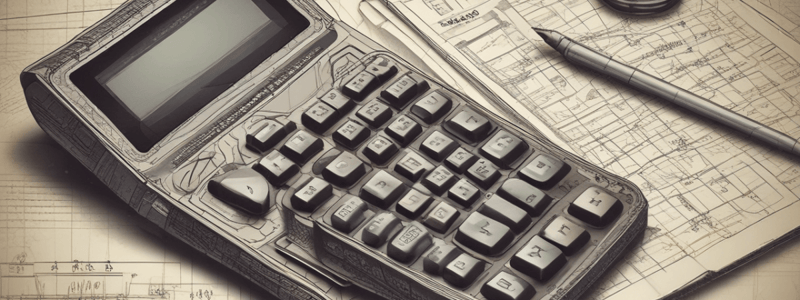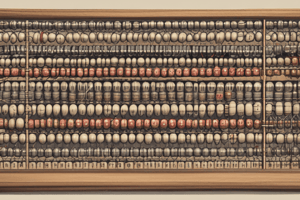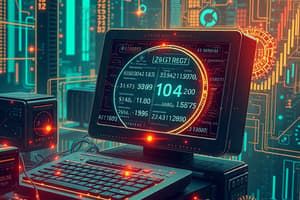Podcast
Questions and Answers
What was the main purpose of Blaise Pascal's invention, the 'Pascaline'?
What was the main purpose of Blaise Pascal's invention, the 'Pascaline'?
- To help his father, a tax supervisor, add large numbers quickly and accurately (correct)
- To create a prototype for modern computers
- To perform all four arithmetic operations
- To invent a machine that could multiply and divide
Who invented the first calculator to perform all four arithmetic operations?
Who invented the first calculator to perform all four arithmetic operations?
- William Oughtred
- Blaise Pascal
- Pascal's father
- Gottrfried Leibniz (correct)
How many machines did Blaise Pascal build?
How many machines did Blaise Pascal build?
- 20
- 100
- 10
- 50 (correct)
What was invented by William Oughtred in 1633?
What was invented by William Oughtred in 1633?
What happened to the basic machines invented in the 17th century?
What happened to the basic machines invented in the 17th century?
What was the innovation of the 'Step Reckoner' calculating machine?
What was the innovation of the 'Step Reckoner' calculating machine?
What was the purpose of Ada Lovelace's development?
What was the purpose of Ada Lovelace's development?
What was the significance of Joseph Jacquard's invention?
What was the significance of Joseph Jacquard's invention?
What was the result of Herman Hollerith's design?
What was the result of Herman Hollerith's design?
What was the impact of Charles Babbage's calculating machine?
What was the impact of Charles Babbage's calculating machine?
What was the purpose of the machines invented by William Oughtred and Blaise Pascal?
What was the purpose of the machines invented by William Oughtred and Blaise Pascal?
What was the innovation of William Burroughs' invention?
What was the innovation of William Burroughs' invention?
What was the common theme among the inventions of the 17th century?
What was the common theme among the inventions of the 17th century?
Study Notes
Computing in the 17th Century
- 1633: William Oughtred invented the slide rule, a notable early computing device.
Early Calculating Machines
- 1642: Blaise Pascal invented the "Pascaline", a basic calculating machine to aid his father, a tax supervisor, in quick and accurate addition of large numbers.
- Pascal built over 50 machines.
Advances in Calculators
- 1673: Gotfried Leibniz invented the "Step Reckoner", the first calculator to perform all four arithmetic operations.
Legacy
- Over the next century, many others imitated and improved these basic machines.
Notable Early Computing Devices
- 1633: William Oughtred invented the slide rule, an early computing device.
- 1642: Blaise Pascal invented the "Pascaline", a basic calculating machine to help his father, a tax supervisor, with quick and accurate calculations; he built over 50 machines.
Calculating Machines
- 1673: Gottrfried Leibniz invented the "Step Reckoner", the first calculator to perform all four arithmetic operations.
Precursors to Modern Computers
Automated Loom
- 1801: Joseph Jacquard invented an automated loom to weave fabric designs using wooden cards with strategically punched holes, a concept later used in early computers.
Calculating Machines and Algorithms
- 1821: Charles Babbage invented a steam-powered calculating machine that computed tables of numbers, marking a shift away from human operation.
- 1848: Ada Lovelace developed the first algorithm, providing step-by-step directions for using Babbage's machine.
Mechanical Adding Machine and Punch Card Systems
- 1885: William Burroughs invented a mechanical adding machine.
- 1890: Herman Hollerith designed a punch card system to count a nation's population, saving time and money.
Studying That Suits You
Use AI to generate personalized quizzes and flashcards to suit your learning preferences.
Description
Learn about the early developments in computing and calculators, from the invention of the slide rule to the first calculator that could perform all four arithmetic operations.




